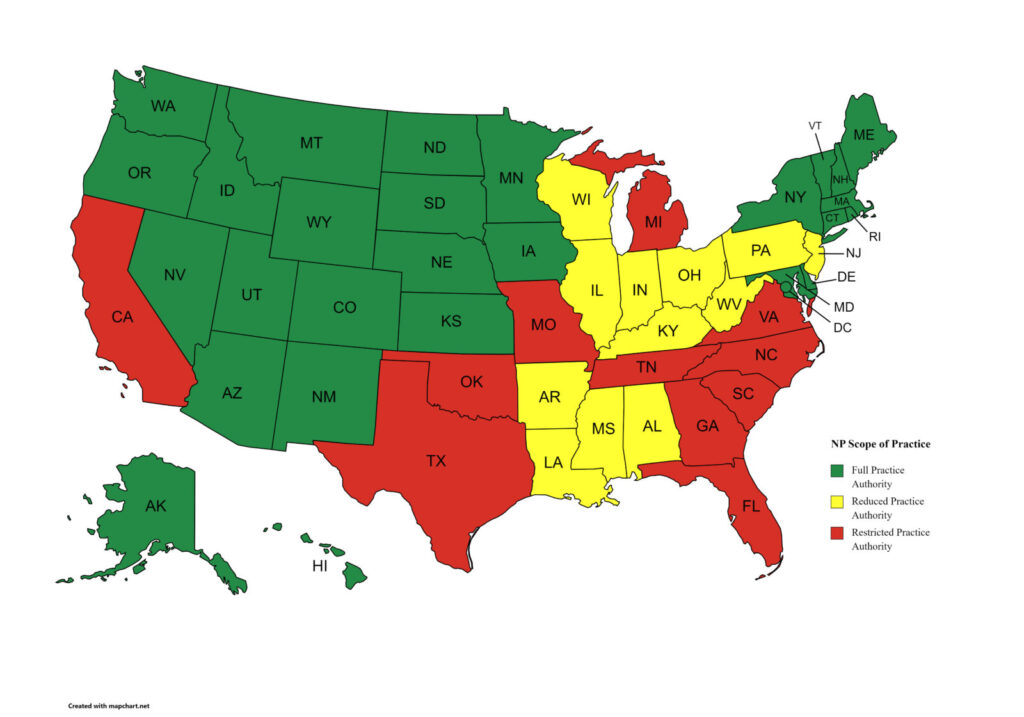

Nurse practitioners are vital to modern medicine. Whether they’re collaborating with a physician or working independently, these skilled medical providers help millions of Americans every day. But an NP’s ability to practice depends significantly on the state. So, in what states can nurse practitioners practice independently and where can NPs open their own practice?
27 states are nurse practitioner independent practice states, which means they can evaluate patients, order tests, and prescribe medication.
Other states, however, do not allow NPs to work autonomously via independent practice. Instead, these states require NPs be supervised by a physician.
Read on to learn more about the challenges NPs face, where NPs can practice independently, and what the best states are if you’re an NP looking to care for patients.
A lack of independent practice autonomy creates extra obstacles for NPs to overcome, such as longer wait times for patients and limitations on how well NPs can actually care for their patients. These restrictive laws are hurting the medical industry, affecting patient care, and deterring RNs who want to pursue NP careers.
Granting NPs full practice authority will help them work productively and efficiently. As the physician shortage continues to exacerbate, allowing NPs greater autonomy will improve not only their ability to perform their own jobs, but also the whole U.S. healthcare system.
FOR SPECIFIC DETAILS ABOUT AN NP’S SCOPE OF PRACTICE, SEE OUR INFOGRAPHIC, “CAN AN NP DO THAT?“
There are 27 states that grant NPs full practice authority, which means they can “evaluate patients; diagnose, order and interpret diagnostic tests; and initiate and manage treatments, including prescribing medications and controlled substances, under the exclusive licensure authority of the state board of nursing,” according to the American Association of Nurse Practitioners (AANP).
A total of 12 states grant NPs what’s called “reduced practice authority,” which limits an NP in performing one or more of their duties or requires them to collaborate with another health provider to treat patients.
The remaining states operate under “restricted practice,” which requires NPs to be completely supervised by another health provider.
Nurse Practitioners can practice independently in the 27 states with full practice authority: Alaska, Arizona, Colorado, Connecticut, Delaware, Hawaii, Idaho, Iowa, Kansas, Maine, Maryland, Massachusetts, Minnesota, Montana, Nebraska, Nevada, New Hampshire, New Mexico, New York, North Dakota, Oregon, Rhode Island, South Dakota, Utah, Vermont, Washington, Wyoming.
Here’s a map using data from the AANP that illustrates the 27 NP Independent Practice States in Green.

Nurse practitioners can open their own practice in the same 27 states that offer full practice authority: Alaska, Arizona, Colorado, Connecticut, Delaware, Hawaii, Idaho, Iowa, Kansas, Maine, Maryland, Massachusetts, Minnesota, Montana, Nebraska, Nevada, New Hampshire, New Mexico, New York, North Dakota, Oregon, Rhode Island, South Dakota, Utah, Vermont, Washington, Wyoming.
While most states with full practice authority officially recognize nurse practitioners as primary care providers, South Dakota does not have an official state law defining whether or not NPs can be primary care providers.
Some of the best states for nurse practitioners, in that they allow NPs to open their own practice with full autonomy and few restrictions, include:
As you may have noticed, mmany of the best states for nurse practitioners are located in the Northwest, Northeast, and Southwest.
Washington, Oregon, and Alaska all allow NPs autonomous practice and provide other freedoms.
The Evergreen State is often noted as one of the best states for NPs to open their own practice. Among Washington’s many freedoms for NPs is the ability to prescribe medicinal marijuana to patients.
Like its neighbor, Oregon grants NPs many freedoms, but not without some restrictions. According to 2017 state law, NPs are required to complete a minimum of 384 hours of practice as a registered nurse before being issued a NP license.
Compared to other states on this list, Alaska is one of the most lenient. The Last Frontier allows NPs to practice immediately following graduation from their program, despite any potential pending certificates or exams.
Rhode Island and New Hampshire stand out in the Northeast as welcoming states for NPs.
Only recently has Rhode Island embraced the potential role NPs can play in the healthcare system. Prior to 2008, the state did not allow NPs to have prescriptive authority, but a law passed that same year gave NPs the full autonomy that they have today.
The Granite State embraces the need for NPs in healthcare by allowing them complete autonomy to practice. New Hampshire also grants temporary licenses to recently graduated NPs who still need to complete the national certificate exam.
Arizona and New Mexico shine as welcoming states for NPs to start their practice with few restrictions.
Nurse practitioners within Arizona are granted nearly complete practice autonomy. The state’s only limitation requires NPs to practice within their specialty and certification. Besides this one limitation, NPs enjoy many freedoms in the state.
Granting much of the same freedoms that its neighbor affords to NPs, New Mexico is considered one of the best states for NP practice. The state even offers a $3,000 tax credit to eligible NPs and other healthcare providers who choose to work in rural areas. And for those still in school, New Mexico may cover two years of school payments in exchange for work in underserved areas.
Within the Southwest, Nevada and Utah also grant NPs independent practice, but restrict the prescribing of certain medications. Surprisingly, California, a traditionally liberal state, does not allow NPs much autonomy.
Editor’s Note: This blog was originally written by Katie McBeth and updated by Mike Connors in September 2023.
We're Barton Associates, the Locum Tenens Experts. We work with thousands of hospitals, medical practices, and organizations across the United States and its territories that need talented providers for short- and long-term engagements. Inspired by the pioneering, humanitarian work of Clara Barton, the Barton Team recruits physicians, PAs, NPs, dentists and CRNAs in a wide variety of specialties, so that we can quickly place them in locum tenens assignments nationwide.

What do you call a nurse practitioner? For decades, nurse practitioners and physicians have debated whether an NP with a doctor of nursing practice (DNP) or PhD degree can refer to themselves as a doctor. So, are nurse practitioners doctors? And who gets to decide? Physicians claim NPs calling themselves “doctor”.